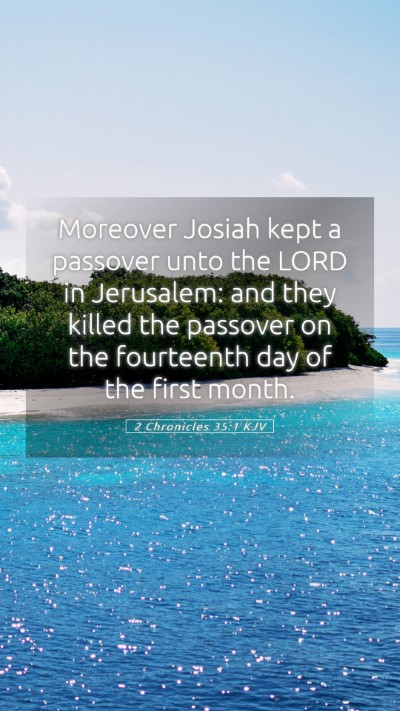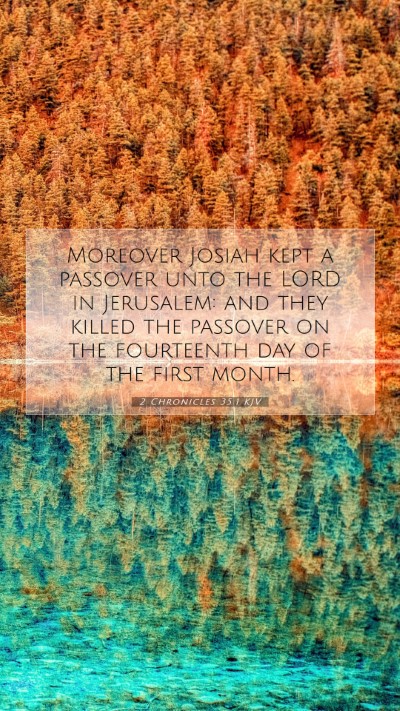Understanding 2 Chronicles 35:1
Bible Verse: 2 Chronicles 35:1
“Moreover Josiah kept a passover unto the LORD in Jerusalem: and they killed the passover lambs on the fourteenth day of the first month.”
Overview
The verse captures a significant moment during King Josiah's reign when he reinstituted the celebration of the Passover feast. This act was not merely a ritualistic observance; it represented a national return to covenant faithfulness and obedience to God’s commandments.
Historical Context
King Josiah, who became king at a young age, initiated reforms to restore true worship in Israel following a period of idolatry. The historical context of this verse involves the rediscovery of the Book of the Law, which led to nationwide repentance and a desire to return to the practices ordained by God.
Bible Verse Commentary
-
Matthew Henry's Commentary:
Henry emphasizes that Josiah's act of keeping the Passover was a critical step in reviving true worship among the people of Judah. It showcased his commitment to God and encouraged the nation to align with divine ordinance.
-
Albert Barnes' Notes:
Barnes notes that the observance of the Passover was an important part of Jewish identity and religious practice. By reinstating it, Josiah demonstrated his leadership in fostering a renewed covenant relationship with God.
-
Adam Clarke's Commentary:
Clarke highlights the importance of timing and preparation for the feast. The mention of the “fourteenth day of the first month” underscores adherence to specific instructions given in the Law concerning festival dates, reflecting obedience and reverence for God's commands.
Meaning and Interpretation
This verse encapsulates several themes relevant to understanding Scripture:
-
Restoration:
The observance of Passover symbolizes a restoration of faith and practice. It illustrates how the people sought to reconnect with their heritage and covenant with God after years of neglect.
-
Commitment to God:
By keeping the Passover, Josiah and the people demonstrated their commitment to God’s commandments, which is essential for maintaining a healthy relationship with the divine.
-
Community Worship:
This event was not an isolated act of worship; it was a communal gathering that integrated the community's shared identity as God's chosen people.
Application for Today
For modern readers, 2 Chronicles 35:1 serves as an invitation to reflect on the significance of worship in our lives and communities:
- How do we actively participate in communal worship today?
- In what ways can we restore the meaning of our religious practices to align with true faithfulness to God?
- Are there traditions or commandments we might neglect that deserve renewed attention?
Cross References
This verse relates closely to the following passages:
- Exodus 12:1-14: Instructions regarding the Passover feast
- 2 Kings 23:21-23: Josiah's reforms and the celebration of Passover
- Neh 8:13-18: The celebration of the Feast of Tabernacles, showing the continued importance of observance
Conclusion
In summary, 2 Chronicles 35:1 holds rich implications for understanding Scripture and encourages believers to explore the meaning of Bible verses within their historical context while applying their teachings to modern life.


